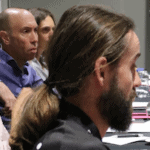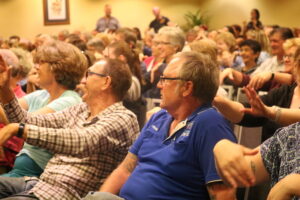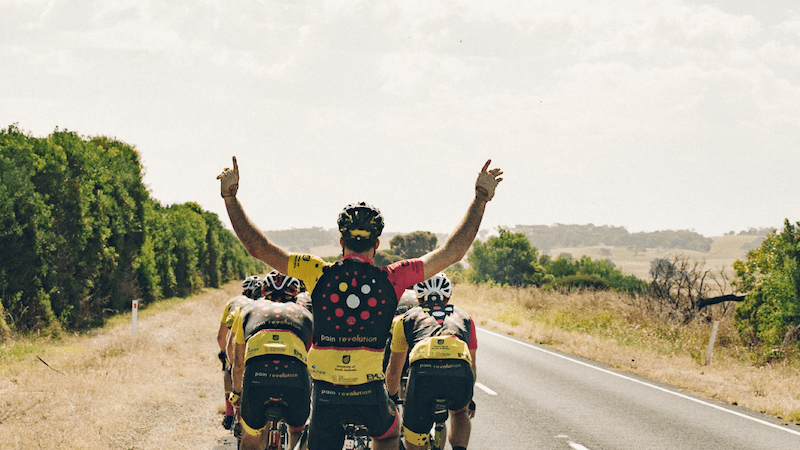After our 2018 Rural Outreach Tour from Sydney to Albury, Lorimer and the Pain Revolution crew put their heads together to work out a vision that would inspire the organisation to grow over the coming years.
It’s a huge ambitious vision; ALL Australians will have access to the knowledge, skills and local support to prevent and overcome persistent pain.
People living outside of major metropolitan areas have lower access to basic services, and less choice in the services they receive in their local community. Travelling to get medical care adds further to the burden of persisting pain. With the establishment of the Local Pain Educator program, there’s hope that these areas can have at least equal (and maybe better!) evidence-based care for people to get on the road to recovery.

The heroes of this story are the Local Pain Educators, who forms the essential bridge to reaching people living with persisting pain in rural and regional Australia.
The first trailblazing group of 13 health professionals have just completed their first year in the Local Pain Educator Program (LPEP). The Local Pain Educators (LPEs) blitzed their first big milestone – finishing the postgraduate Certificate in Pain Science through the University of South Australia. This course is for qualified health professionals to increase their understanding and skills in assessing and treating people in pain, and covers both theory and practice of helping people recover from persisting pain.
The LPEs have shown enormous commitment to the LPE program. They have studied more than 10 hours per week, in addition to their normal work, and they have worked with their mentors to plan and conduct education events within their communities. The current cohort are located in NSW (in the Murray, Murrumbidgee, Monaro and Illawarra regions), in Western Australia’s Margaret River and in North-West Victoria’s Wimmera region.

This year, the LPE’s outreach activities included:
- pain education sessions with the general public (including people in pain)
- retirement home visits
- talks to junior athletes about pain
- lectures to health professionals, students (including the Australian Medical Students Association Rural Summit) and community organisations such as Rotary, Probus, and U3A.
The aim of the program is to give all community members an opportunity to learn about pain and how it is treated, and in doing so, drive positive changes to how pain is talked about and treated in these communities.
Over the next 12 months, the LPEs will continue to work with their communities and run educational events in different sectors of the community. In their third year, the group will step up to mentor further cohorts of educators, and create a sustainable network of educators throughout the country which will eventually fulfill that big vision we have for set for ourselves.
All Pain Revolution programs are grounded in research and evidence, and the impact of the program in communities it is being studied in collaboration with the Institute for Musculoskeletal Health at Sydney University.
We asked three of our 2018 LPE group about their experiences in the program. Jennifer Smith (General Practitioner in Temora, NSW), Nicola Marshall (Physiotherapist in Port Kemba, NSW) and Kylie Perry (Physiotherapist in Wagga Wagga, NSW) share their experiences of the past 12 months in LPEP.

What you have learnt during the year that benefits your local community?
Jennifer: “I have been blessed to be a part of the first wave of Local Pain Educators tackling the problem of persistent pain in country areas. The value of framing our discussions with patients and clinicians on what causes pain in an evidence-based biopsychosocial way is huge, and has completely changed the way I talk to patients about pain. It has given me the grounding and confidence to communicate both with colleagues and with community members to change the paradigm of pain treatment from an ineffective medication-centric doctor-led model to one which promotes ownership and active management of persistent pain. As well, it has led to the development of a local hub of practitioners (LPEs and others) who are passionate about continuing to develop local pain education and management options into the future.
Nicola: “Being part of the Local Pain Educator Experience has given me a renewed enthusiasm towards my own understanding of pain and excitement to pass this knowledge on to my local community. I have learnt that pain is a protective output produced by the brain when it feels that there is credible evidence of danger to you. However, this system can become overprotective in the case of chronic pain leading to long term suffering, fear and a sensitised nervous system; BUT it is possible to retrain this system by improving our understanding of pain, with the potential to reduce suffering, improve quality of life and enable recovery for those living with chronic pain.”
Kylie: “This year I have certainly gained an amazing amount of knowledge and skills to help my local community. I have learnt strategies to improve local community engagement with our programs. I have also been given the opportunity to broaden both my pain science knowledge and my confidence and skill as an effective educator. This has already been of benefit to my local community with presentations I’ve completed so far being well received and providing an avenue for ongoing conversations around pain, it’s complexity and best management options.”
How does the Local Pain Educator Program benefit health professionals in rural and regional Australia?
Jennifer: “The value of the program is in its linkage of a truly accessible post-graduate course in pain management with ongoing connection both to peers and mentors who can motivate and guide your efforts to make sure that every hour you spend equipping yourself with knowledge actually translates to the spread of that knowledge into your community.”
Nicola: “The LPE program has given local clinicians the opportunity to upskill their knowledge base, learning from amazing researchers and clinicians in the field of pain science and be able to put this knowledge in to practice to their wider community. It has given us the opportunity to link in with local community groups widening our scope of practice and disseminating up to date evidence based management strategies to treat pain to a broad based audience linking in both health professionals and general public.”
Kylie: “The LPE program provides an extremely knowledgeable and supportive network of clinicians and pain science experts to assist with gaining and developing this knowledge and skills. It has been a big year of learning and experimenting and this support has given me the confidence and drive to continue on my journey to learning and sharing as much as I can about pain to improve outcomes for people in pain in my community. I am looking forward to continuing to develop and adapt our education programs next year with more local community engagement activities.”
In 2019, Tasmanian health professionals are joining our passionate group of LPEs. Pain Revolution is collaborating with The Department of Health and HR Plus to establish a state-wide network of educators across Tasmania. They will start their studies in March and it’s just in time to meet with the Pain Revolution as we visit Tasmania for our Rural Outreach Tour!
This post first appeared on Pain Revolution’s webpage here



